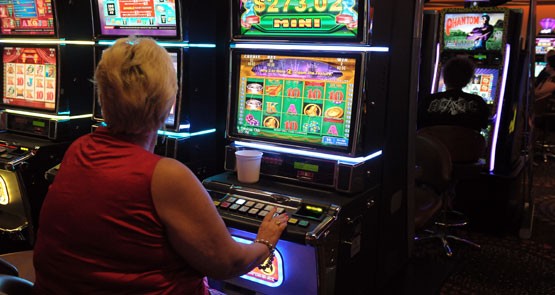
Earlier this week Wesfarmers, which owns Coles, Target, Kmart and Officeworks, announced its desire to trial a $1 bets limit on their poker machines to minimise problem gambling.
In Australia, 40% of gambling revenue comes from problem gamblers, 20% from those with a developing problem.
Problem gamblers represent a social cost of about $4.7 billion a year in Australia, according to a 2010 Productivity Commission report. The Economist reported in 2014 that Australia’s gambling losses were equivalent to $1144 per resident, the highest in the world.
Why does Coles own poker machines?
Legislation in Queensland prevents Coles from selling alcohol at bottle shops without also owning hotels. As a result, Coles owns and operates 89 pubs, mostly in Queensland, and the pubs include poker machines.
Woolworths owns many more machines, through its Australian Leisure and Hospitality Group.
Why is Coles changing its attitude to poker machines?
Four years ago, GetUp lobbied both Coles and Woolworths to impose $1 bet limits. Woolworths argued then that shareholders didn’t want the limits so the supermarket giant would not impose them. Coles said it would reduce its “exposure” to the industry but was later granted a license for 75 more machines in Queensland.
But, two and a half years ago, Wesfarmers managing director Richard Goyder told Tim Costello, a prominent member of the Alliance for Gambling Reform, he wanted to tackle problem gambling.
Despite an earlier failure to act, Goyder now seems genuinely interested in addressing the issue.
Why is Coles now interested in addressing this issue?
The Australian Financial Review reports Goyder and Coles chief executive John Durkan approached the major poker machines manufacturers to implement a $1 bet limit trial only to be rebuffed.
The gaming industry says the $1 limit is untested, but 2001 research suggested it would reduce problem gambling.
What are the ramifications of this decision?
Coles stands to lose potential revenue from machines, but the company could also attract investors who are more interested in ethical investment over profit-making.
Dr Charles Livingstone, a prominent academic on poker machines from Monash University, says the optics are important. “It’s an admission from a major retail operator that pokies are unconscionable and can’t be justified if a company wants to be known as consumer-friendly, ethical and responsible.”
The other less lofty reason why Coles is doing this could be to place pressure on Woolworths to do the same and therefore reduce the profits of ALH when Woolworths’ supermarket profits are rising and Coles’ are falling. Goyder rejected this reason.
Is reform on the cards?
Yes and no.
The idea of a $1 limit on poker machines has been floated since the Productivity Commission recommended it in 2010. Although this time it seems the drive is not coming from the political realm but the corporate sphere.
Despite the failure of the GetUp campaign in 2012 and the current deadlock with manufacturers like Aristocrat, IGT, Konami, SG Gaming and Ainsworth Game Technology to trial a $1 bet limit, Livingstone is hopeful of change.
“The fact that the manufacturers aren’t playing ball is very telling. Their way or the highway. But pokies aren’t god given; they’re dumb computers that can be changed however they wish.”
Is Woolworths going to follow suit?
No.








I happened to see an interview with a gambling industry spokesman on Network Ten’s The Project on Monday night. He was explaining how difficult it is to programme machines to a limit of $1.
Apparently it is incredibly complicated – more so than neuro-surgery or an Apollo moon landing (my words) – & this explains why the gambling industry is reluctant to re-jig the poker machines. It’s the degree of difficulty, it’s not as easy as you might imagine. Shucks, it’s just so darn hard!
He almost managed to keep a straight face..almost. Apparently the gambling industry regards the entire populace as naive suckers not merely those poor sods corralled in their casinos & pokie pens.